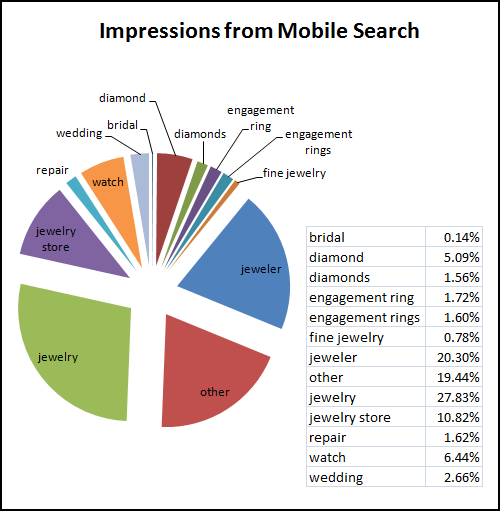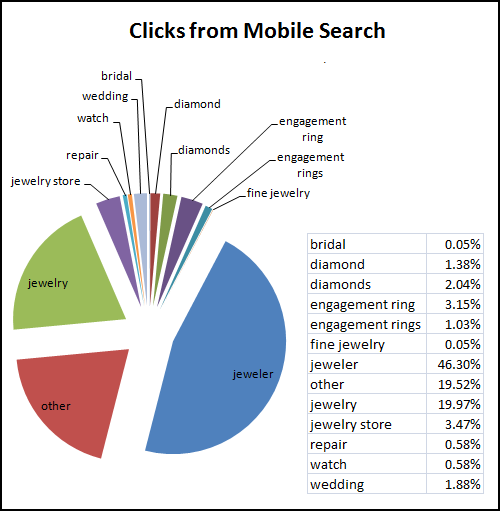
In this edition of the Daily Golden Nugget, I'm exploring keyword data collected between November 1 and December 31, 2014 from many retail jeweler websites.
I collected a large amount of keyword data from people using Google's desktop search, mobile search, and image search. The mobile search data is very interesting. Last week, I presented the mobile keyword data for diamonds and engagement rings. Today, I'm focusing on these keywords:
* jewelry
* jewelry store
* jewelers keywords
You'll find some interesting--and directly actionable--information here. I'm using the same pie charts from the previous Nugget since I'm still referencing the same data.
I grouped the keywords of my data into phrase groups that shared the same words. All the phrases containing the word "jeweler" were grouped together, all the phrases containing the two words "jewelry store" were grouped together, and all the phrases containing "jewelry" without the word "store" were also grouped together. I also included British English and common misspellings of the words in the appropriate groups.
The data presented here today is only from users searching from their mobile device. These are primarily smartphone users, but it also includes tablet users.
Impressions
This pie chart shows all the keywords I'm specifically analyzing. As you can see, the phrases "jewelry store," "jeweler," and "jewelry" accounted for the most of the mobile search impressions.

10.82% of mobile searches included the phrase "jewelry store." By comparison, the desktop searches seen here only show 5.17% of searches for stores.
The majority of the phrases were in the format of "jewelry stores in _________." Fill in that blank with a town, county, or state name.
The second most popular phrase is "jewelry store(s) near me." The singular/plural versions are equally as popular.
I expected to see those first two phrases because they have been at the top of the "jewelry stores" phrase list for several years.
Thanks to this massive data collection, I can now see several more phrases that are starting to gain popularity on mobile search.
They are:
* find me a jewelry store
* closest jewelry store
* good jewelry store
* jewelry store hours
* jewelry stores nearby
* nearby jewelry stores
* nearest jewelry store
* where is the closest jewelry store
These seven phrases represent more relaxed voice activated search queries. Google Hummingbird was designed to answer these natural search request types, but you can help it along with subtle SEO tweaking on your site.
I didn't include this next phrase in the above list because I feel it's unique to the Holiday Season. There was a considerable appearance of the phrase "jewelry stores open _______." Fill in that blank with "on Sunday," "late," and "on Christmas eve." Keep this in mind next year when you need a headline for your emails, social posts, and websites because the simple title of "We're open Late/Sunday/Christmas Eve" will grab last minute attention.
Subtle SEO Tweaking for Stores
Here are some quick examples of how you can help Google match your website to a few of the above phrases.
* find me a jewelry store
Potential home page sentence: Custom jewelry design is one of the services you'll find at our jewelry store in Totowa, NJ.
This is a close match with the words in the correct order.
* closest jewelry store
Potential home page sentence: We are the closest jewelry store to the center of town.
This would be an exact phrase match. You might have to be creative here and say you are close to the shopping mall or some other landmark.
* jewelry stores nearby
Potential home page sentence: Our jewelry store is nearby the Home Depot on Route 46 in Totowa, NJ.
This is another close phrase match with the words in the correct order.
* jewelry store hours
I've been conducting a store hours test on several websites since 2009 when I discovered that 11% of home page visitors were clicking on a page called Store Hours. Since then I've added a dedicated Store Hours page to all the websites I maintain, with similar results.
Even though it might seem silly and redundant, you could create a dedicated Store Hours page on your website to answer the direct search request that I'm seeing in these impressions. This is nothing more than a list of your daily hours. Google seems to like these simple pages and quickly shows them in SERPs.
Mobile Searches for Jeweler
More than 20% of the recorded search impressions were for "jeweler" related phrases. The majority of these searches were for the specific names of the jewelry stores. These were probably preexisting customers or those who were searching for a store after seeing an ad somewhere else.
When not specifically searching for a store name, many searches included these queries:
* jewelers in {city/state/county}
* jewelers near me
* local jeweler near me
* nearest jeweler
Mobile Searches for Jewelry
The search phrase grouping including the word "jewelry" was the largest for mobile search. Many of the searches included specific designer jewelry names like these examples:
* camelot jewelry
* elle jewelry
* frederic duclos jewelry
* pandora jewelry
Other than the specific designer names, there were a lot of simple two word phrases describing the type of jewelry that people were looking for, including these:
* antique jewelry
* diamond jewelry
* gold jewelry
I also notice several service related mobile searches, like these:
* custom jewelry
* engraving jewelry
* jewelry appraisal
* jewelry engraving
Matching search queries for these phrases is a simple matter of having them on your website.
Mobile Clicks
This pie chart shows the number of mobile clicks for my chosen keyword grouping:

Notice that the number of clicks for "jewelry store" is only 3.47% even though the impressions were up at 10.82%. I attribute this to the improvements of Google search results and the Google+ Local listings that appear. Users don't have to visit your website when they are using a mobile device; they just want to quickly find out where you are and use Google Maps to get to you.
The "jeweler" phrase had the most clicks with 46.30%. Consider for a moment that the searches for "jeweler" were mostly related to specific jewelry store names, like Perosi Jewelers. This provides a hint that people who are using search on their smartphones are looking to directly engage with your store more than anything else. Instead of typing your web address into their mobile browser they are finding your website simply by searching for it. This is known as a "Navigational Search."
The mobile clicks on phrases including the word "jewelry" seemed evenly divided between all the phrases. I didn't find any one phrase that stood out above the others. The examples I gave above are good guidelines for what types of content and "jewelry" related phrases you should have on your mobile site.
Mobile Content
The jewelry industry has been slow to deploy mobile websites and responsive websites, but the speed of deployment is starting to pick up. The data I've analyzed today all came from mobile searches, and it's important to note that Google understands the difference between a website that displays one type of content on mobile and another on desktop versions of a website.
In order to correctly rank on mobile search results, you need to make sure the information that appears on your mobile website is appropriate for the needs of the mobile user.
This is the 3rd in a series of Daily Golden Nuggets presenting some deep keyword research data from the 2014 Holiday Season for retail jewelers. I've included links to the previous Nuggets below.
1. Keyword Impressions and Clicks for desktop search queries
2. Holiday Diamond and Engagement Ring Mobile Keyword Data








